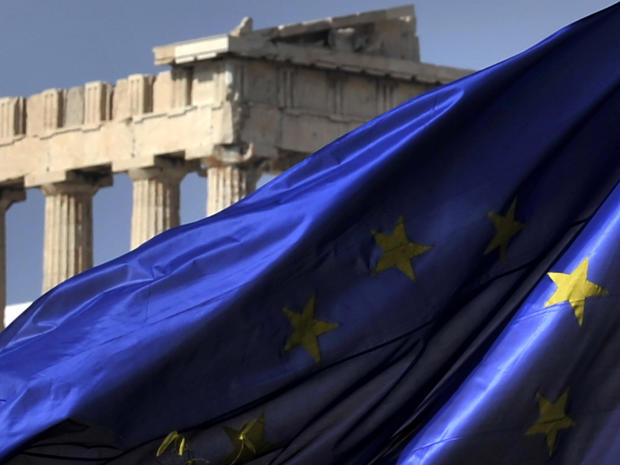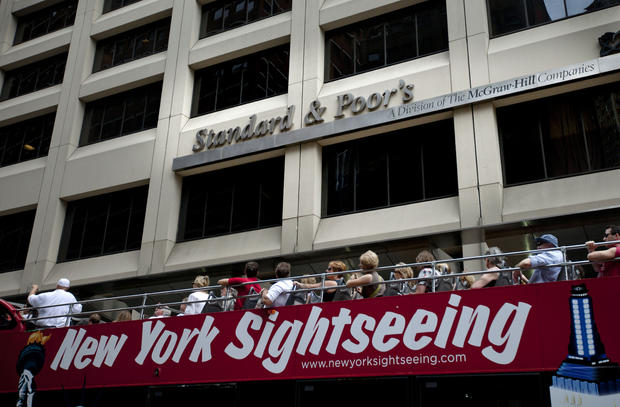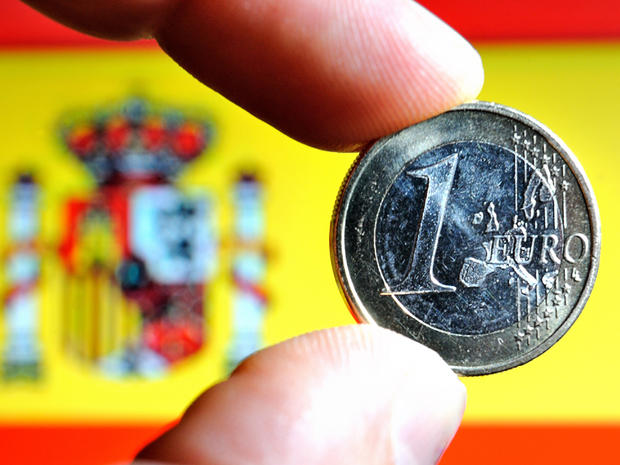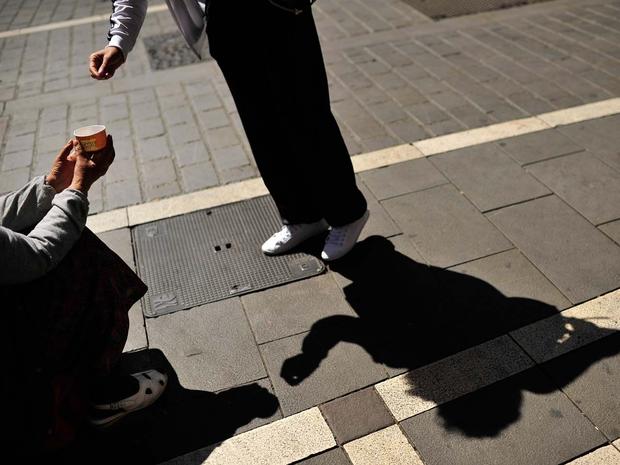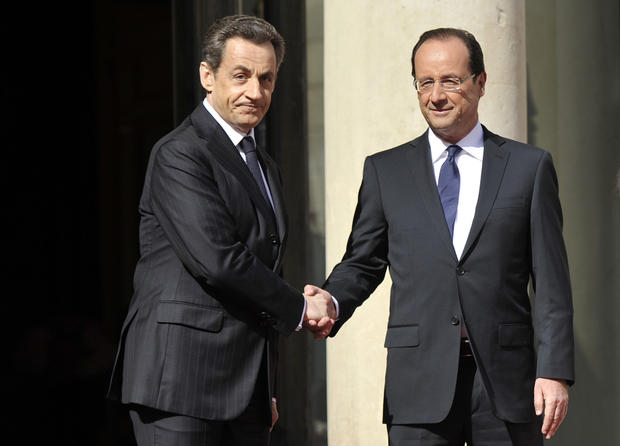Europe: A year of living dangerously
(MoneyWatch) For Europe, 2012 began as it did for so many others -- with a hangover.
The symptoms stemmed from a failure by the European Central Bank to bail out the Greek government. A year-and-a-half, earlier the European Union and International Monetary Fund had loaned $144 billion dollars to Greece to avert a default by the country on its financial obligations.
The rescue package came with a lot of strings, notably that Greece take immediate action to sharply cut government spending. Such austerity in public spending, along with tax hikes, was supposed to get Greece's economy going again. In fact, it had precisely the opposite effect, plunging the company into a depression.
As the year began, Greece's unemployment rate was 21 percent, and its debt amounted to 133 percent of the nation's $306 billion GDP. It was clear to all that another bailout was needed, although concerns were growing about throwing good money after bad.
At the same time, investors were getting nervous about deteriorating economic conditions in Italy and Spain. This was driving up the costs of borrowing for both those nations, raising fears that Europe's third- and fourth-largest economies could be shut out of the international borrowing markets altogether. The countries' size would make a bailout impossible.
As 2012 comes to a close, the immediate risk of a Greek default, along with a so-called "Grexit" from the eurozone, have ebbed -- for now. Bond yields in Italy and Spain have receded. But if the currency union is not in imminent danger of collapse, the region's financial crisis continues.
Europe: A year of living dangerously
The Great Greek Bailout, Part 2
In late February, eurozone leaders agreed to a second bailout package for Greece, this one worth $172 billion. It also required private bondholders to take a 53 percent write-down on their debt. By contrast, international lenders, such as the EU and the IMF, were exempted. They had become Greece's largest lenders by this time.
In return, lenders required Athens to implement further budget cuts. Although that may have ensured that Greece made good on these loans, it also further undermined economic growth.
A leaked IMF report showed that the plan's best-case scenario, which was based on the Greek economy shrinking much more slowly than it actually was, would have reduced the nation's debt-to-GDP ratio only to 120 percent by the end of the decade. By the middle of the 2012, that scenario would officially be deemed "unrealistic."
Europe: A year of living dangerously
Why are credit ratings agencies still in business?
On February 28, after the second Greek bailout was approved, credit rating agency Standard & Poor's cut Greece's credit rating and said the country's government was in "selective default." Within a week, the amount of interest Greece must pay to borrow money for 10 years fell from 36 percent to 18 percent.
Typically, such downgrade would result in higher borrowing rates, indicating that financial markets disregarded S&P's judgment on Greece's financial condition.
Europe: A year of living dangerously
EU tries to build a "firewall" in case Spain explodes
At the end of March, after weeks of telling investors that Europe's economy was stable, the EU announced that it would try to increase the size of an emergency relief fund to bail out troubled countries. It was an odd move. After all, if the region was recovering, then there would be no need for a massive rescue fund. Despite the contradictory messages, German Chancellor Angela Merkel reversed her previous opposition to padding the bailout fund and backed a $266 billion increase aimed at stopping the spread of financial contagion.
This did little to reassure investors who had noticed that Spain, also suffering from a sharp decrease in growth, would likely need bailout for many of the country's banks. Like their financial counterparts in the U.S., Spanish lenders have seen enormous losses because of a bubble in real estate bubble.
Europe: A year of living dangerously
Austerity kills: Suicide rates rise across Europe
In early April, 77-year-old Dimitris Christoulas killed himself on a street in Athens across from the Greek Parliament. The former pharmacist left a note which read, in part:
[the] government has annihilated all traces for my survival, which was based on a very dignified pension that I alone paid for 35 years with no help from the state. And since my advanced age does not allow me a way of dynamically reacting (although if a fellow Greek were to grab a Kalashnikov, I would be right behind him), I see no other solution than this dignified end to my life, so I don't find myself fishing through garbage cans for my sustenance.
Before the financial crisis first began, Greece had the lowest suicide rate in Europe at 2.8 per 100,000 inhabitants, according to Eurostat. That has now almost doubled and is rising at an alarming rate. A Greek Ministry of Health study found that the suicide rate in the first half of 2011 was 40 percent higher than in the previous year. Suicide also has risen across Europe's hardest-hit economies.
In November, the Spanish government ordered a halt to evictions following the suicide of 53-year-old Amaya Egana Chopitea in Baracaldo.
Along with suicides, budget cuts to the public health care system in Greece has resulted in rising rates of most communicable illnesses. Greek hospitals also are chronically short of even the most basic medicines.
In April, IMF Managing Director Christine Lagarde publicly acknowledges that austerity measures are turning out to be "self-defeating" in aiding troubled economies.
Europe: A year of living dangerously
Spain hits the boiling point
In January, Spain announced that the country had entered its second recession in three years, with unemployment at 23 percent. Then things got worse. By April the jobless rate was nearing 25 percent and 50 percent for those under 35.
On April 12 Spanish Prime Minister Mariano Rajoy said: "It's not possible to rescue Spain." That month borrowing costs began a rapid rise that didn't halt until July, when both the country's five- and 10-year bonds were at 7.5 percent, an unheard of occurrence. The reason for alarm: Portugal, Ireland and Greece had all been forced to seek bailouts when their borrowing rates surpassed 7 percent.
Later that month, EU leaders declared that Spain's banks would not need a bailout. Spain also announced that was partially nationalizing Bankia, the country's fourth-largest bank.
On May 25, Bankia suspended its stock and asked the government for a $23 billion bailout. That same day, Catalonia, Spain's wealthiest region, also asked for a bailout. In all, Spain's regional governments owe $175 billion.
Europe: A year of living dangerously
Economic chaos leads to political convulsion
French voters in May ousted pro-austerity President Nicholas Sarkozy, replacing him with Socialist Francois Hollande. The country's new leader vows to push back against the massive government spending cuts and tax hikes favored by German Chancellor Merkel as a solution to the eurozone's financial crisis.
That same month, Greece held an election that was supposed to serve as a referendum on whether the nation would continue to use the euro. Yet after votes are counted, nothing is decided.
The country's right-of-center New Democracy party, which supported staying in the eurozone, won 108 seats in Greece's 300-seat parliament. This was twice what any other party won, but not enough to form a government. The left-leaning Syriza party, which wanted to repudiate the nation's debts, took second with 52 seats and the socialist Pasok party got 41, 119 fewer than it had in the last election.
Adding to the political chaos was the rise of right-wing extremist party Golden Dawn, which won 21 seats despite never before holding office.
With the political parties unable to form a coalition government, Greece is forced to hold another election in June. Following that vote, New Democracy is eventually able to cobble together a coalition and form a government.
Europe: A year of living dangerously
Spain asks for a "line of credit" to bail out its banks
On June 28, after months of assurances that Spain would not need international help in rescuing its banks, the country does just that. Prime Minister Rajoy requests "up to a maximum" of $122 billion from the EU to recapitalize the banks and provide a buffer in the event of future crises. Over the following month, Spain's borrowing costs shoot up amid fears that its economy is weakening and its unemployment rate hits 25 percent.
Europe: A year of living dangerously
The ECB calls for a siesta - and it works!
At the end of July, with interest rates for both Spain and Italy highly volatile, ECB President Mario Draghi announced he would do "whatever it takes" to protect the euro. Using the indirect language favored by the heads of central banks around the world, he said the bank "may undertake outright open market operations of a size adequate to reach its objective." Draghi added that European Union officials should "stand ready" to also use their bailout fund in the bond market.
To many people's surprise, the plan works -- interest rates subside and Europeans head off for their annual August vacation
In September, Draghi makes another move that immediately pays dividends by pledging that the ECB will buy unlimited amounts of the government bonds of countries struggling to manage their debts. Even more impressive is that the vow has kept interest rates down without the lender so far having to spend any money to contain borrowing costs.
Europe: A year of living dangerously
Crisis averted -- next crisis, please
While the ECB plan enabled Spain to continue borrowing, it did not end Europe's financial crisis.
At bottom, that's because the crisis is the result of nations with failing economies sharing a currency with nations that have stronger economies. Although the idea of kicking the most troubled nations, starting with Greece, out of the euro is discussed, the eurozone remains intact.
But challenges are legion. For instance, although the EU has agreed to a single supervisor for more than 100 large banks, it is still a long way from creating a single banking system with a single set of regulators to monitor and bind together eurozone financial institutions. This is the only way to reassure investors that banks aren't misrepresenting their financial strength, as happened in several EU nations.
More fundamentally, the same ECB plan that has at least temporarily calmed global financial markets also removes the incentive for political leaders to make difficult and unpopular choices. In this sense, the eurozone's future remains on hold, with 2013 likely to be a pivotal year.
Europe: A year of living dangerously
As a new year beckons, the hangover continues
The number of challenges facing EU leaders as 2012 comes to a close is markedly larger than it was at the start of the year. Practically the whole of Europe has gone into recession. Germany, Europe's strongest economy, is may follow suit in the first quarter of 2013. Unemployment and demands for government aid continue to rise even as countries further slash their budgets in order to lessen their debt loads.
For Spain and Greece, even a mild recession would represent a dramatic improvement. Unemployment in both countries now tops 26 percent. Greece's economy barely functions, and Spain is deteriorating . The Greek healthcare system is so bad that Greeks are now coming down with illnesses, like malaria, that are all but unknown in other industrialized nations
On Nov. 28, the EU agreed to pay $48 billion to bail out four Spanish banks. A week later, finance ministers approved another $65 billion payout to Greece. Taxpayers in Germany and other healthier nations are growing increasingly unhappy at the prospect of funding more bailouts.
Meanwhile, people in Spain, Greece and Europe's other ailing nations are growing increasingly angry about budget cuts that have savaged social services just as they are most needed. Protests, including violent riots, are on the rise.
The latest plan to deal with Greece's woes seems as problematic as earlier efforts. In November, finance ministers and the IMF agreed to a revised aid deal for Greece that includes lower interest rates on Greek bailout loans and a debt-buyback program. This plan requires Greece to cut its debt-to-GDP ratio to 124 percent by 2020, rather than 120 percent, while committing to bring its debt levels "substantially below" 110 percent by 2022.
Yet even if that target is hit it would still be far more than the nation could afford to pay. In Spain, the government is able to continue borrowing money, but to date this has mostly ensured that lenders get repaid, rather the ignited economic growth.

